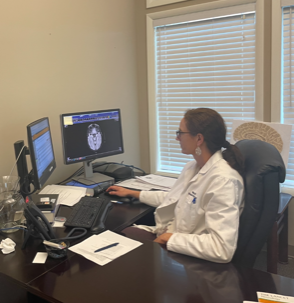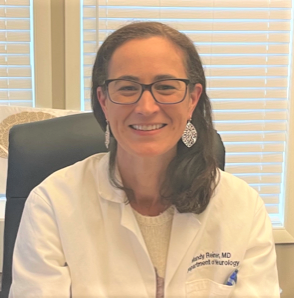As seems to be the case in life, I stumbled into the Institute MTS program without quite knowing what I was saying “yes” to. Looking back I can see there is no other way around it except to say that it was a decision that was guided. I had just finished a post-baccalaureate premedical program the year before, after having majored in the liberal arts (history and philosophy) at Notre Dame, but after a few years and due to varied circumstances, began to think of a career in medicine – a career, I thought, in family medicine or Ob/Gyn. These had been my initial attractions, having spent some time in developing countries, and being moved to want to contribute to the pro-life cause. Fast-forward 15 years and I find myself a general neurologist in east Alabama, my home state. Some days this still comes as a surprise to me!

Despite my initial inclinations toward primary care medicine, I was drawn to neurology not only because of the unsolvable enigma that is the human brain – that mysterious interface of physics and metaphysics where personality, memory, reasoning, vision, and sensory and motor function somehow occur in a sea of beautifully intertwined electrical pathways – but also because of the patient population that neurology draws. I completed the MTS program in 2007, following which I went to med school at UAB in Birmingham, my neurology residency at Medstar-Georgetown, returned to UAB for a fellowship in neuroelectrophysiology, then moved to Auburn where I have been in practice in east Alabama since 2016.
My patients are of all ages and demographics. As I am an adult neurologist I see a broad spectrum of pathologies from teenagers with migraines and epilepsy, developmentally delayed adults (who know they are my favorites), middle-aged people in crises because their lives have been interrupted by an unexpected event such as a brain tumor, multiple sclerosis, a traumatic brain or spinal cord injury, ALS or other degenerative or inflammatory muscle disease, or older patients who upon retiring find their plans altered by a new diagnosis of Parkinson’s or dementia. The day can be as varied as a benign study for carpal tunnel to an examination for brain death in the ICU.
But there is a different sort of pathology that I was not prepared to meet in such a dramatic fashion. There is in modernity an epidemic of meaninglessness, of loneliness. This manifests itself in varied ways: a hopelessness with regard to treatment, a defeatist attitude about life in general, depression and anxiety which mount in the face of added stress of illness or pain, and in the most dramatic cases, old wounds that have never healed manifesting as non-neurologic symptoms rooted in deep trauma, frequently accompanying a history of sexual abuse in childhood. In the face of these almost-daily encounters, I cannot imagine my life without the great gift of having studied at the Institute. In the words of John Paul II, “Man cannot live without love. He remains a being that is incomprehensible for himself, his life is senseless, if love is not revealed to him, if he does not encounter love, if he does not experience it and make it his own, if he does not participate intimately in it.” I have come to experience the truth of these words, which now hang on the wall of one of my exam rooms, ever more each day.
The two years I spent studying theology at the Institute no doubt change the way I practice medicine, more than I would ever be able to put into words. This difference is not limited to an academic diagnostic exercise, though taking into account all of reality, the whole person and his/her history, frequently leads to a diagnosis. But just as important for my life is my community of friends from JPII who are the people in my life who help me to think through what is going on in the world, in the life of my patients, and in my own life in relation to them, to God, and to the Church. Healing can mean many things. While assisting in the physical healing of a patient is sometimes exciting, practicing neurology has placed me in the always-vertiginous position of openness to a sort of healing that implicates myself as a fallen creature – fallen, yet invited to participate in the salvation of the whole.
